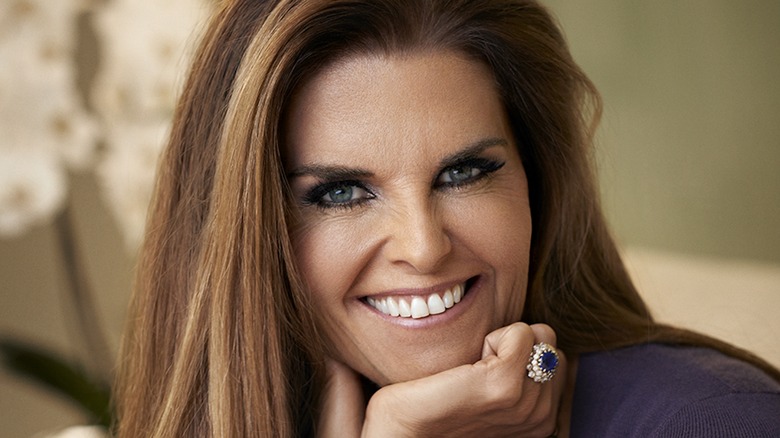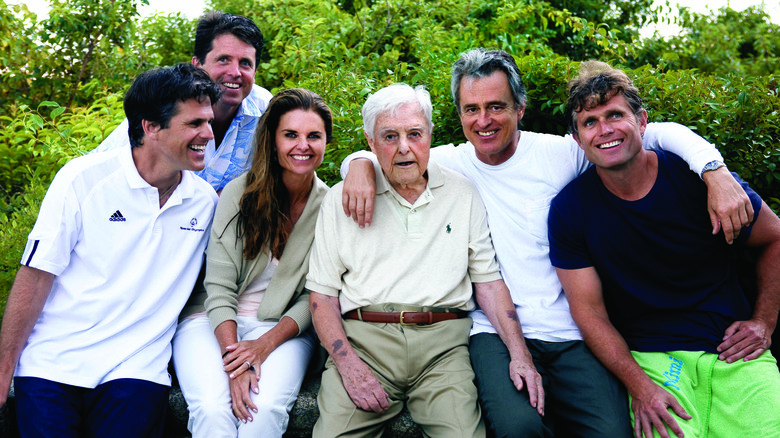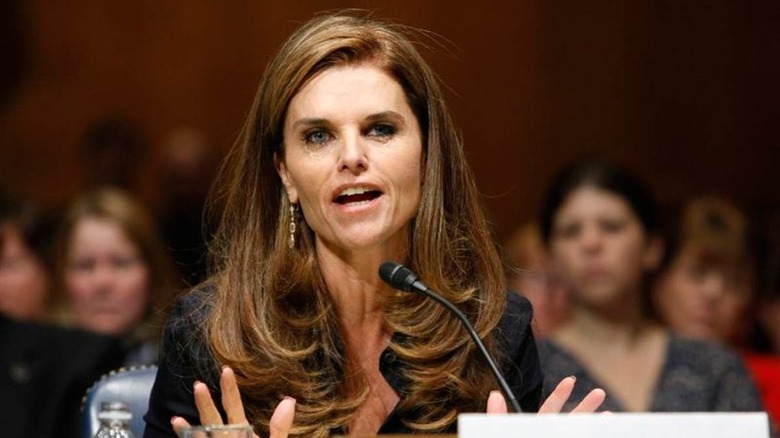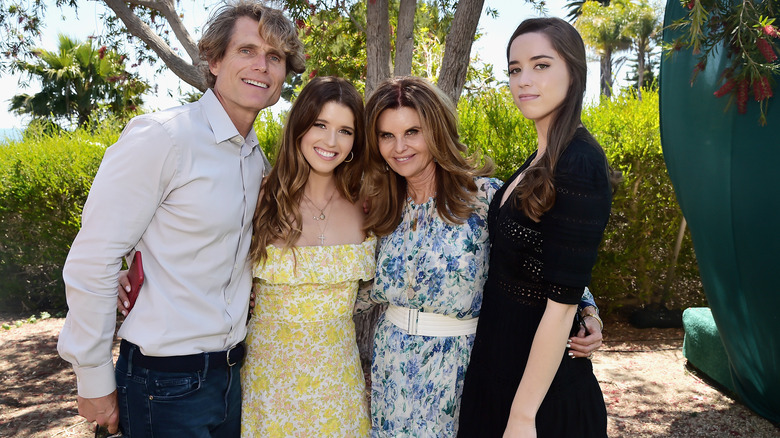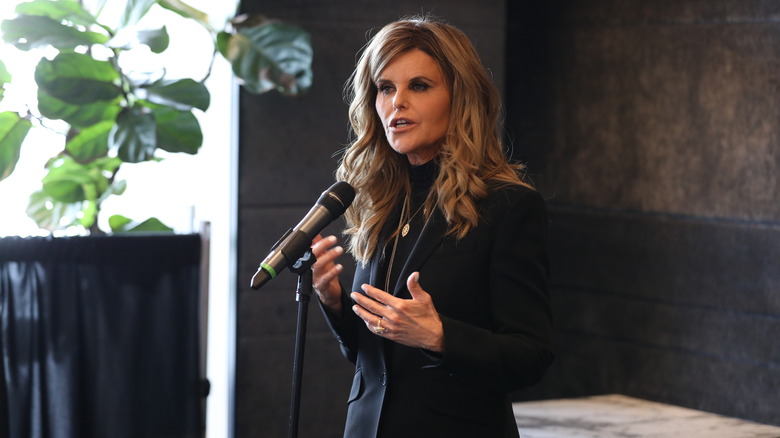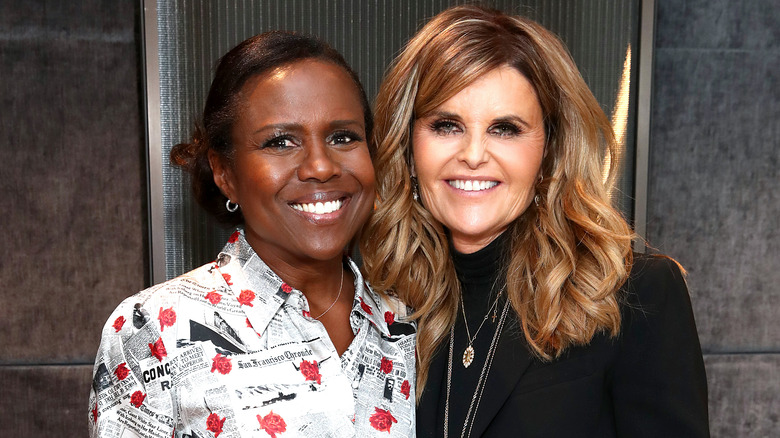Maria Shriver Talks Alzheimer's: New Research, Prevention, And Its Impact On Women - Exclusive Interview
Maria Shriver has led an extraordinary life. She was born into an American dynasty, the niece of former President John F. Kennedy and Senators Bobby and Teddy Kennedy. Her mom started the Special Olympics, and her dad was one of the founding fathers of the Peace Corps. In her own words, "I have always been surrounded by extraordinary people doing extraordinary things."
Shriver went on to do extraordinary things as well. She became an award-winning journalist, and served as the First Lady of California for seven years. During her tenure, Shriver implemented multiple programs to help women and those struggling with poverty.
Shriver has always focused her work on helping those who need it the most, and when her father was diagnosed with Alzheimer's Disease in 2003, she found her new mission. In an exclusive interview with Health Digest, Shriver shared about how her father's diagnosis sparked a passion for Alzheimer's research and advocacy, the work she's done, and her brand new partnership with the Cleveland Clinic.
A life-changing diagnosis
How did your father's Alzheimer's diagnosis change the course of your life and your advocacy?
My father was diagnosed in 2003, and I began noticing almost immediately how the disease affected him and our family. At the time, I didn't know much about Alzheimer's and was looking at doctors, researchers, and other families who were coping with the disease to try and comprehend what was next.
Unfortunately, there weren't many resources out there, and like most people, I struggled to find answers. I was influenced by my own experience to raise awareness around this issue and aimed to start a conversation around Alzheimer's to help support families going through a similar journey.
What did you learn about Alzheimer's along the way that prompted you to become a voice for Alzheimer's research?
I learned how Alzheimer's affects not only those diagnosed, but entire families, from spouses and partners to children and grandchildren. I wanted to know more about where current research was headed and what doctors were doing to treat the disease. From what I gathered, there weren't enough conversations around Alzheimer's, or any urgency to curb the epidemic. I wanted to raise these questions to help spread awareness, so that we may begin addressing this pressing issue as a country.
Highlighting Alzheimer's impact on women
How did the groundbreaking "Shriver Report" change our understanding of Alzheimer's?
The report helped bring women into the Alzheimer's conversation. Women are predominantly impacted by the disease, whether as the ones being diagnosed or are the caregivers for someone with Alzheimer's. This comprehensive study was the first to report publicly that Alzheimer's disproportionately impacts women and helped shine a light on the impact of the disease on women, while also calling for more gender-specific research to be conducted so that we may begin supporting women by understanding their brains.
What made you decide to start the Women's Alzheimer's Movement (WAM)?
I wanted to create an organization that recognized and raised awareness around women as being at the epicenter of the global Alzheimer's epidemic. Through WAM, we've been able to help fund and support cutting-edge research on women's brains, research that has led us closer to changing the course of this disease by understanding some key factors unique to women that may put them at higher risk for developing Alzheimer's. Alongside supporting critical women-based research, we have also provided families with much needed education and advocacy — and focus much of our work on how to prevent Alzheimer's.
What has WAM done to further our understanding of Alzheimer's in women?
Since we started funding seed grants into Alzheimer's research five years ago, we have supported almost 40 studies, each aimed at unraveling why women are disproportionately affected by the disease. Some studies have looked at underlying biological mechanisms in women, some at the role of hormonal factors, and we are increasingly focused on studying the impact of lifestyle factors that may help reduce the risk of developing the disease in the first place.
For instance, we know stress is a contributing risk factor for many diseases, including Alzheimer's, and that women often have a higher incidence of stress in their lives than men. So, understanding the impact of stress on women's lives helps us empower women with that information — and convince them of the need to adopt stress management techniques in their lives. Our goal is to make up for years of women's health being under-researched and little understood. We need to fill in the gaps that can answer what it is about the brains, bodies, and lives of women that puts them at higher risk for Alzheimer's and so many other neurological diseases. If we do this, if we invest in women's health, including brain health, we believe we can help prevent the development of many neurological diseases, including Alzheimer's.
Alzheimer's as a family disease
You're also passionate about helping children understand Alzheimer's. Can you tell us about some of the work you've done in this sphere?
When my father was diagnosed with the disease, I saw how it affected my children and was inspired to write "What's Happening to Grandpa?", a children's book that helps explain Alzheimer's to kids. It offers ways for children to interact with a person with dementia.
While I wrote that book to help children, I have also come to realize that we adults may have more to learn from children and how they interact with people who have dementia. They often come to the relationship without irritation or anger that their grandparent isn't "the same" as they were earlier, and hence can interact with less judgment, and more playfully.
How did WAM get involved with the [Cleveland Clinic's] Lou Ruvo Center for Brain Health [to create] the nation's first Alzheimer's disease prevention center for women?
Cleveland Clinic is one of the nation's leading hospitals — currently ranked No. 2 in U.S. News & World Report's 2021-2022 Best Hospitals Rankings — and integrates clinical care with research and education. I have a deep friendship with Larry and Camille Ruvo, who founded the Lou Ruvo Center for Brain Health in Las Vegas [operated by the Cleveland Clinic], and in 2018, when we were discussing the need for more research alongside caring for those with Alzheimer's, we came up with the idea of starting the Women's Alzheimer's Movement Prevention Center, the first [such] center just for women.
It took two years to get off the ground, and from the high demand for the program, we know that this is a service women want and need. And now that WAM has formally joined Cleveland Clinic as a partner, we hope to expand this prevention center to other locations throughout their very impressive global health system.
The California Task Force on Alzheimer's Prevention
Can you tell us more about the California Task Force on Alzheimer's Prevention?
Since 2019 I have been working alongside Gov. Newsom to address the policy and health challenges faced by the growing number of people living with Alzheimer's and other dementias in California. We convened a task force comprised of 30 diverse individuals who have expertise or experience with Alzheimer's and related issues, and set out on a listening tour to gather ideas and wisdom from every community in the state.
The task force was charged with developing recommendations on how local communities, private organizations, businesses, government, and families can prevent and prepare for the rise in the number of cases of Alzheimer's disease and forge a bold path forward for families. The task force delivered ten recommendations to the Governor in December 2020, many of which are already being implemented.
Partnering with the Cleveland Clinic
Where did the idea for [WAM's partnership with the Cleveland Clinic] come from?
I think it was a natural and perhaps inevitable outgrowth of our successful collaboration around the Women's Alzheimer's Movement Prevention Center in Las Vegas. Once [WAM and Cleveland Clinic] recognized the impact we could have together on women's health around Alzheimer's, we were inspired to take the next step and address the need to study other neurological diseases, most of which also impact women disproportionately. We recognized in each other a shared desire to understand women's health better and more fully, and are committed to using our various skills, expertise, and talents to do so.
What are the short-term and long-term goals of the partnership?
In the immediate short term, WAM at Cleveland Clinic will continue working on the sustainability and growth of the WAM Prevention Center, which we would like to see thriving in other clinics within the Cleveland Clinic system. Longer term, I think we are committed to researching and understanding the connections between women's lives and their brain health overall.
How is this partnership going to change the landscape of Alzheimer's research, especially for women?
Together our aim is to address and reduce women's risk for Alzheimer's disease and understand the connections between gender and all neurological diseases. We believe that the expertise and ambition at Cleveland Clinic is designed to change the landscape for brain health.
For one, its Neurological Institute just announced the launch of the world's largest brain study, following 200,000 healthy older individuals over the next 20 years in order to study their brains over time and observe which and how some may develop diseases. That's ground-breaking science at work, and we are very proud to be partners in that kind of innovation.
Why the focus on preventing Alzheimer's versus finding a cure?
Currently, research has shown us that up to 40% of Alzheimer's disease cases could be prevented and/or delayed with lifestyle modification. Given the road to a cure is long and complex because of the very nature of this disease, why not focus on what is in our control today and try to prevent it?
Keep up to date on all things brain health at The Women's Alzheimer's Movement.

